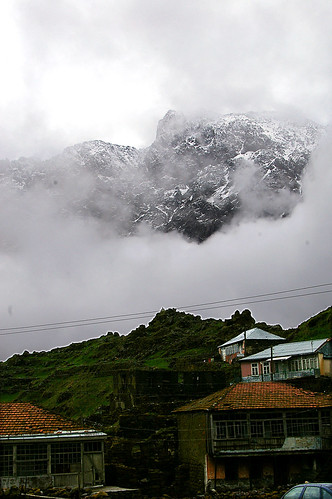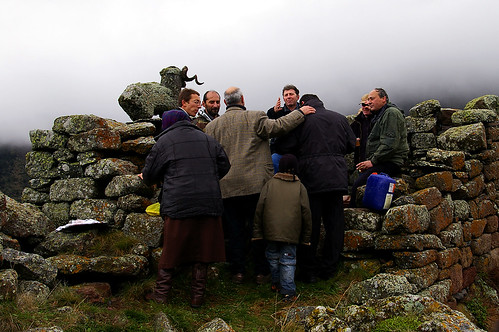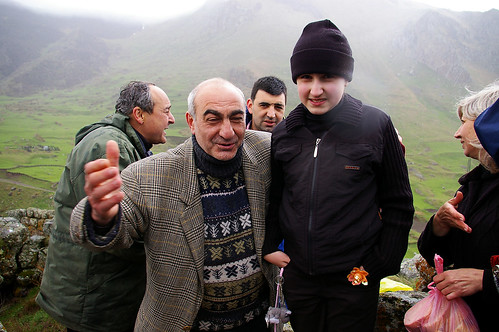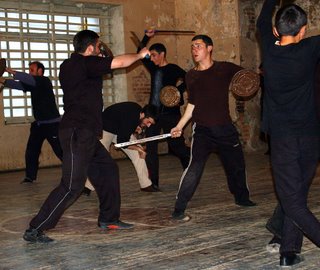Guess Who's Coming to Dinner
If one takes a great leap of faith in the Georgians' ability to stay out of another war for the next decade or so, and thereby afford themselves the opportunity to settle into some stability and comfort, then one must ponder the following depressing scenario: can the Georgian cult of hospitality—which has thrived through invasions and conquest and occupation—survive the Americans?
It's a question on the flipside of my mind, everytime a taxi driver or doorstoop vegetable vendor trills in delight upon hearing that I'm from America. And it was on my mind last weekend, when I was one of three American girls driving through the high Caucasus mountains just shy of the Russian border, who, for lack of anything else to do, followed a sign pointing up the side of the mountain to a village called Tsdo.
 Tsdo turned out to be a little cloud village clinging to the side of the mountain and so muffled in fog we couldn't see the Darial gorge gaping below us or, except for rare gaps in the cloud cover, the craggy mountains encircling us. It's impossible to cruise into a village that has (we later learned) a wintertime population of four families and not be noticed. Feeling a bit dumb and self-conscious we got out of the car and feigned a monstrous preoccupation with the carpet of fog over the mountain edge, as if anyone would drive up all that way to stare at the fuzz. But we'd been spotted, and so began Act I of the timeless Georgian performance of Guess Who's Coming to Dinner?
Tsdo turned out to be a little cloud village clinging to the side of the mountain and so muffled in fog we couldn't see the Darial gorge gaping below us or, except for rare gaps in the cloud cover, the craggy mountains encircling us. It's impossible to cruise into a village that has (we later learned) a wintertime population of four families and not be noticed. Feeling a bit dumb and self-conscious we got out of the car and feigned a monstrous preoccupation with the carpet of fog over the mountain edge, as if anyone would drive up all that way to stare at the fuzz. But we'd been spotted, and so began Act I of the timeless Georgian performance of Guess Who's Coming to Dinner?
No truer thing has been so succinctly said about Georgia than what Neal Ascherson managed in a 2004 essay:
So within 30 seconds of our fumbling about around the car, an old woman who was washing veggies in the mountain runoff had sussed us out, figured out (to her immense pleasure) that we were American guests, and was dragging us bodily along to her house by the arms yelling all the while "Modi, modi!" Come, come! What to do but lope along and see what happens?
Can you believe all the dumb luck? It was a holiday that day in that little cloud village—and only in that village. Something related to a spot on the high hill that was sacred to them. They'd already slaughtered the sheep, but we were still in time to go and light candles at the shrine and drink wine with the men who were holding court up there.
 Now clocking in at five minutes into our sojourn in Tsdo. We've been adopted into an extended family of about 12, we're being bundled up the hill with great fanfare ("our American guests!" they told any onlookers that could be found), and before too long we're on an old stone outcropping swimming in fog, greeted by the wine-guzzling revelers like tardy cousins who'd they'd been expecting to turn up for ages.
Now clocking in at five minutes into our sojourn in Tsdo. We've been adopted into an extended family of about 12, we're being bundled up the hill with great fanfare ("our American guests!" they told any onlookers that could be found), and before too long we're on an old stone outcropping swimming in fog, greeted by the wine-guzzling revelers like tardy cousins who'd they'd been expecting to turn up for ages.
They said it was surely God that brought us all the way from America to their little village on this of all days, and as I glanced down at my Target-bought sneakers swimming in fresh, scarlet sheep's blood, I had to concede their explanation was as good as any.
When it began raining too hard we retired back to the family house for a lunchtime supra. They fit us in seamlessly and cheerfully, promising us with each new glass of wine glorious futures and children as beautiful as we were. And when they learned that the third girl of our trio, the one visiting from the U.S., did not speak Russian or Georgian but instead Spanish, the men thought for a minute and then started howling out Besame Mucho with great gusto, which was really a serenade she had not been expecting in the Caucasian highlands.
Before coming to Georgia, and old Russian professor warned me not to buy into the myths that Georgians have about themselves. But what to do when at least one of the myths—that age-old tale of a people so welcoming that a stranger can wander into a remote mountain village and find herself instantly fed and warmed and welcomed—turns out to be true? And how much of it depends on the novelty of the foreign visitor? Will the legendary hospitality slip back into legend when tour buses snake up and down the roads and Rustaveli Avenue throngs with Georgia on My Mind-type souveniers? It's the tourism tug-of-war. I know Georgia needs the crowds desperately, but moments like these I want to hoard all for myself.

It's a question on the flipside of my mind, everytime a taxi driver or doorstoop vegetable vendor trills in delight upon hearing that I'm from America. And it was on my mind last weekend, when I was one of three American girls driving through the high Caucasus mountains just shy of the Russian border, who, for lack of anything else to do, followed a sign pointing up the side of the mountain to a village called Tsdo.
 Tsdo turned out to be a little cloud village clinging to the side of the mountain and so muffled in fog we couldn't see the Darial gorge gaping below us or, except for rare gaps in the cloud cover, the craggy mountains encircling us. It's impossible to cruise into a village that has (we later learned) a wintertime population of four families and not be noticed. Feeling a bit dumb and self-conscious we got out of the car and feigned a monstrous preoccupation with the carpet of fog over the mountain edge, as if anyone would drive up all that way to stare at the fuzz. But we'd been spotted, and so began Act I of the timeless Georgian performance of Guess Who's Coming to Dinner?
Tsdo turned out to be a little cloud village clinging to the side of the mountain and so muffled in fog we couldn't see the Darial gorge gaping below us or, except for rare gaps in the cloud cover, the craggy mountains encircling us. It's impossible to cruise into a village that has (we later learned) a wintertime population of four families and not be noticed. Feeling a bit dumb and self-conscious we got out of the car and feigned a monstrous preoccupation with the carpet of fog over the mountain edge, as if anyone would drive up all that way to stare at the fuzz. But we'd been spotted, and so began Act I of the timeless Georgian performance of Guess Who's Coming to Dinner?No truer thing has been so succinctly said about Georgia than what Neal Ascherson managed in a 2004 essay:
Georgia may be Orthodox, but its true religion is hospitality. A friend described driving through a Georgian village and seeing, in the rear mirror, men running out into the street and vainly waving bottles at the departing car. All that's best in Georgia is done on the spur of the moment, using the stranger as a pretext to give and to rejoice. Hours of drinking, feasting and toasting can follow, ending heaven knows when or where.Or as a previous Fulbright scholar in Georgia said: "Hospitality in Georgia sometimes resembles a mild form of hostage-taking."
So within 30 seconds of our fumbling about around the car, an old woman who was washing veggies in the mountain runoff had sussed us out, figured out (to her immense pleasure) that we were American guests, and was dragging us bodily along to her house by the arms yelling all the while "Modi, modi!" Come, come! What to do but lope along and see what happens?
Can you believe all the dumb luck? It was a holiday that day in that little cloud village—and only in that village. Something related to a spot on the high hill that was sacred to them. They'd already slaughtered the sheep, but we were still in time to go and light candles at the shrine and drink wine with the men who were holding court up there.
 Now clocking in at five minutes into our sojourn in Tsdo. We've been adopted into an extended family of about 12, we're being bundled up the hill with great fanfare ("our American guests!" they told any onlookers that could be found), and before too long we're on an old stone outcropping swimming in fog, greeted by the wine-guzzling revelers like tardy cousins who'd they'd been expecting to turn up for ages.
Now clocking in at five minutes into our sojourn in Tsdo. We've been adopted into an extended family of about 12, we're being bundled up the hill with great fanfare ("our American guests!" they told any onlookers that could be found), and before too long we're on an old stone outcropping swimming in fog, greeted by the wine-guzzling revelers like tardy cousins who'd they'd been expecting to turn up for ages.They said it was surely God that brought us all the way from America to their little village on this of all days, and as I glanced down at my Target-bought sneakers swimming in fresh, scarlet sheep's blood, I had to concede their explanation was as good as any.
When it began raining too hard we retired back to the family house for a lunchtime supra. They fit us in seamlessly and cheerfully, promising us with each new glass of wine glorious futures and children as beautiful as we were. And when they learned that the third girl of our trio, the one visiting from the U.S., did not speak Russian or Georgian but instead Spanish, the men thought for a minute and then started howling out Besame Mucho with great gusto, which was really a serenade she had not been expecting in the Caucasian highlands.
Before coming to Georgia, and old Russian professor warned me not to buy into the myths that Georgians have about themselves. But what to do when at least one of the myths—that age-old tale of a people so welcoming that a stranger can wander into a remote mountain village and find herself instantly fed and warmed and welcomed—turns out to be true? And how much of it depends on the novelty of the foreign visitor? Will the legendary hospitality slip back into legend when tour buses snake up and down the roads and Rustaveli Avenue throngs with Georgia on My Mind-type souveniers? It's the tourism tug-of-war. I know Georgia needs the crowds desperately, but moments like these I want to hoard all for myself.





